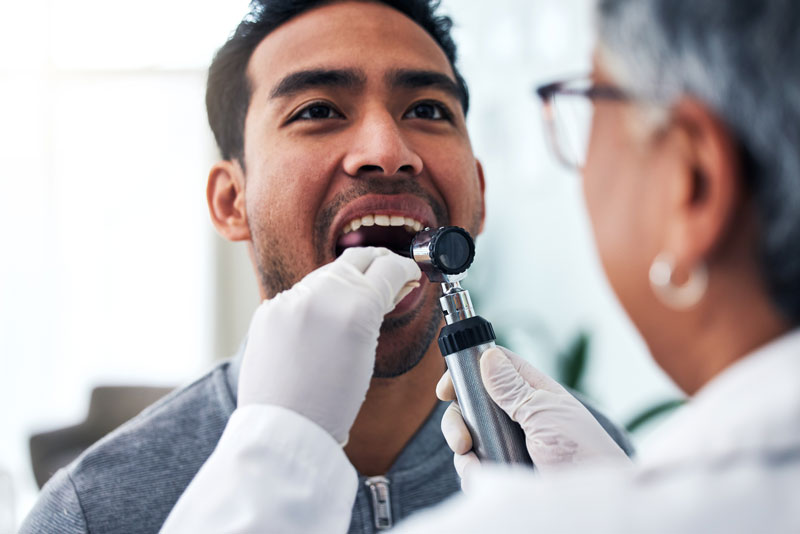Oral cancer is relatively rare, but your risk of developing this condition increases with age. The risk is most significant for those aged over 45. According to the Ontario Dental Association, 5400 people in Canada will be diagnosed with oral cavity cancer and 1500 will die from it.
What Are the Signs of Oral Cancer?
Oral cancer can cause various symptoms, including:
- A sore spot in your mouth or on your lips that fails to heal within two weeks.
- An unexplained lumps or bumps in your mouth, on your lips, or in your throat.
- A persistent sore throat or feeling like something is stuck in your throat.
- Difficulty chewing or swallowing food.
- White or red patches inside your mouth or on your gums or tongue.
- A change in the fit of dental appliances like dentures in Whitby.
- Ear pain or changes to your voice.
Who Is More Likely to Develop Oral Cancer?
Other than your age, various other factors can increase your risk of developing oral cancer. They include the following.
- Smoking or using any form of tobacco.
- Drinking alcohol to excess.
- Being exposed to the sun can increase the risk of lip cancer.
- Certain HPV infections.
- A poor diet that doesn’t include enough fruits and vegetables.
- A weaker immune system.
- Poor oral health.
You may not have realized that dentists were critical in protecting oral cancer in Oshawa earlier. When you have a dental checkup at Margolian Dentistry, our dentists can notice any minor changes to your oral health. We also perform an oral cancer screening.
What Is an Oral Cancer Screening?
An oral cancer screening is a visual examination of your mouth combined with gently feeling the lymph glands in your neck and checking carefully for any signs of lumps, bumps or tissue changes. All dentists are trained to perform oral cancer screenings in Ajax; a visual examination is the gold standard.
However, at Margolian Dentistry, we believe in providing our patients with the best preventive dentistry, and we can use VELscope oral cancer screening technology. The technology uses a small handheld device that emits a blue light. Shining the blue light on your oral tissues causes them to fluoresce.
Healthy oral tissue fluoresces differ from tissues that may have signs of infection or show signs of cell changes. This technology can check for fungal or bacterial infections or precancerous or cancerous changes. It doesn’t replace a visual examination but is an additional resource that helps us detect changes more quickly.
The earlier we can detect any changes, the better the prognosis. When caught early, diseases like oral cancer can be treated less invasively and more successfully.
What Happens If Any Changes Are Detected?
We will unlikely detect anything, but if we do, we might refer you directly to a specialist dentist. We may want to take a small biopsy and send it to a lab for further analysis by a pathologist.
There are a couple of ways of taking a biopsy. One is to remove a small sample of tissue using laser dentistry. Another is a brush biopsy, where a tiny brush is rubbed over the surface to collect some cells. The analysis by a pathologist will soon determine if the cells are anything to be concerned about, and if so, you can be referred for appropriate treatment.
Between your dental checkups, it’s worth monitoring your oral health and contacting us if you notice any rough spots developing inside your mouth or sore spots that fail to heal.


